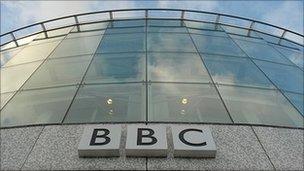BBC Delivering Quality First: reaction
- Published

The BBC's licence fee has been frozen until April 2017
The BBC has set out its proposals on how it will make budget cuts of 20% as a result of the freeze to the licence fee.
The changes will result in savings of around £670m a year from its £3.5bn budget by 2016/17.
Director general Mark Thompson said the plan meant "stretching efficiencies and significant job losses" - with around 2,000 jobs set to be axed.
Here are some of the media, union and government reaction to the announcements.
The Guardian - Dan Sabbagh
One aspect of the cutbacks is troubling. What happens next? Three or four years from now, the BBC has to go back to ministers for the next licence fee deal.
If Thompson is right, and there is not much fat left to cut, then the next time around there is a stark choice. Freeze the licence fee then, and a channel or an entire type of coverage - such as sport - will have to go.
For those who believe in the organisation, respect its quality, integrity and contribution to public life, the prospect of another squeeze is disturbing. Thompson, or his successors, can't fight off inflation for ever - but this time around he has done what he can.
Steve Hewlett - media analyst
The government were afraid that having forced the BBC into a licence fee standstill until 2017, any service closures would rebound on them.
There will be all sorts of things that some viewers, listeners and users will notice and they're not going to be desperately happy about that.
There were lots of things that were hung out there as kind of big "harem scarem" options which they have managed to avoid, but in public terms they'll be pleased if we all go away saying "well it's not as bad as it could have been".
Paul Revior - Daily Mail
The effort to save £1.3bn over four years will be seen as a tacit admission by the BBC that there are limits to its bloated realm.
Observers believe the cut backs - representing around 20% of the BBC's budget - will return the broadcaster to its role of earlier decades when it offered a less comprehensive service and concentrated its efforts on times when most viewers are watching.
Andrew Harrison - chief executive of RadioCentre, trade body for commercial radio
RadioCentre has argued for many years that the BBC's generous public funding for national and local radio should be scrutinised to secure best value for licence fee payers.
Even after these changes BBC radio will still have vast resources. Its real challenge will be to do what DQF promises, and deliver quality with the most distinctive radio services possible.
We look forward to responding to the substance of the Trust's consultation on DQF in due course.
Michelle Stanistreet - general secretary, National Union of Journalists
The reality is that the BBC will not be the same organisation if these cuts go ahead. You cannot reduce budgets by 20% and pretend that everything is the same. It won't be.
Staff who already work in over-stretched news rooms, with not a moment to spare in the day in order to get the job done, know that. The quality of journalism and programming will inevitably be diluted.
These cuts will damage the BBC if they go ahead. We have called for the licence fee deal to be re-opened and a proper public debate to take place about BBC funding.
Gerry Morrissey - general secretary, Bectu
If [Thompson] wanted to sign up to these cuts, which he did without consultation, then he could have said: 'Ok, we cannot do everything - I'm not going to damage the quality, therefore a service is going to go'.
It's not for me to say which service should go, but to actually say that viewers will not know the difference is not true. There is going to be a huge deterioration in quality.
This is his making. He was pushed into this by the government - he accepted it and he's doing the dirty work for the government. We believe the salami-slicing that is happening across the board is a mistake.
Department for Culture, Media and Sport
We welcome that the BBC is thinking hard about what it does and where it should focus in future.
We are committed to an independent, strong and successful BBC that is the cornerstone of British broadcasting. How the BBC allocates its funding in meeting its objectives is a matter for the BBC.
- Published6 October 2011
- Published6 October 2011